Review of Black Orpheus
Introduction
Marcel Camus`s 1959 French film, Black Orpheus (Orfeu Negro) is an amazing colourful, musical explosion of a movie, beautifully transferred on this otherwise bare-bones disc.
It was a complete sensation on its release winning an Oscar, a Golden Globe and a Palm D`or. I don`t think audiences could believe their luck. On the surface, this might have appeared to be a rather dry re-telling of a classical Greek myth, though in the event turned out to be a riotous feast of colour and sound.
Based upon the mythic love of Orpheus and Eurydice, this followed a road already trodden by French auteur Jean Cocteau, though I daresay is infinitely more entertaining than his more serious adaptation.
At the time it was credited for popularising the incredible bossa nova percussive Latin-American beats that are all pervading throughout the film. The truth is though that such music was already in the consciousness of the West, popularised by Beat Generation jazz favourites like Stan Ketz, and already evident in many films of the day. (Well`s `A Touch of Evil` being just one such example). But here the beats are relentless, in true Carnival style. The soundtrack was `written` by Antonio Carlos Jobim and Luis Bonfá, though its most memorable aspect is the multi-layered carnival percussion. The film`s two main theme songs, Manha De Carnival and O Nossa Amor, were both huge hits as a result.
The movie perhaps makes its biggest impact though through its use of colour. Not since the revelation of Brigadoon have I seen such a vibrant and vivid palette of colours, beautifully captured in its original aspect ratio of 1.33:1. From the second the title text falls from view, this film pulsates with a colour palette that Timothy Leary could only dream of glimpsing. It`s some of the most dramatic cinema I have ever seen, belying the fact that the movie was shot on a budget nearly 50 years ago.
Orpheus is played by the infectious and energetic Breno Mello, a real life soccer star, who plays a trolley car conductor who is known as something of a crooner in his hood, much likes and special friend of the sexiest girl in town.
The movie makes very little attempt to subtly work in the Greek narrative, clumsily introducing Eurydice (Marpessa Dawn, a dancer from the USA) into the plot as a visiting cousin to Orpheus`s next door neighbour who has come to Rio to escape a mysterious male stalker who seems intent on killing her.
He appears during the carnival celebrations wearing a `Death` mask and what looks like a spider-man outfit, and we soon learn how nasty he is when he pushes a kid aside to get at his prey.
Orpheus falls in love with the country girl, despite having promised to wed Mira, and Eurydice falls for him having overheard his romantic crooning.
But soon the Greek Myth must run its full course (with a few changes - there are no snakes here) and tragedy strikes, amongst horror and violence, and the final third of the movie is given over to Orpheus`s search for meaning until the final, though predictable tragedy puts an end to his suffering.
The movie must have seemed incredibly racy in its day with very overt references to sex, and some quite `showy` scenes of Mia dancing that may have been acceptable as a display of primitive dance, and yet which certainly helped show her ample assets to good effect. No doubt all this contributed to its popularity at the time, and continues to add to the movies sensory charm to this day.

Video
For a movie nearly 50 years old, this transfer is nothing short of breath-taking. It`s virtually flawless, with rich, vibrant colouring and perfect crushed blacks. Superb! It`s 4:3, though worth noting that it always was so no irritating panning and scanning to ruin your enjoyment here.
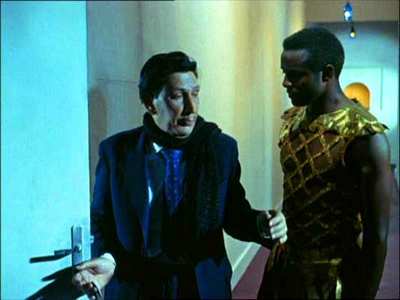
Audio
A perfectly adequate Dolby Digital 2.0 soundtrack. It`s almost worth leaving the movie on for it`s constant bed of Latin-American bossa-nova and samba percussion.
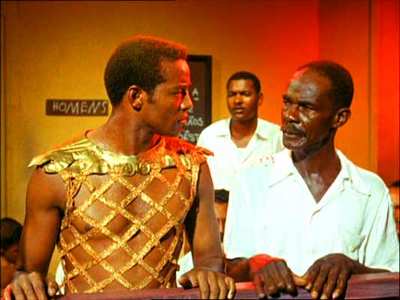
Features
None.
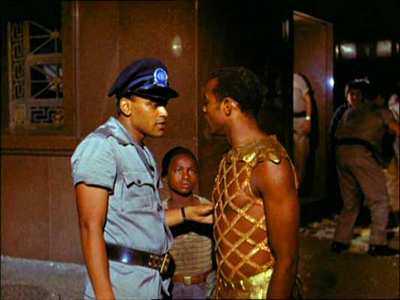
Conclusion
This rich and colourful assault on the senses looks incredibly vibrant in this flawless transfer, despite the film being produced in 1959.
It`s a strange hybrid of low-budget melodrama and documentary, beautifully shot during Rio de Janeiro`s `58 Carnival, and the results remain mesmerising to this day. I don`t know quite why the film is so enchanting. Maybe it`s the combination of `real footage` with contrived drama, and maybe it`s the relentless bongo soundtrack or in all probability, a combination of both.
Some may find the drama a little stilted and contrived for their tastes, and the acting is by no means convincing on one level. But it`s a film filled with a naïve energy that takes what is, after all, a fairly bleak narrative, and turns it into such a positive experience.
Whatever the case, it`s a fantastic feast on the eyes and ears and this superb transfer is thoroughly recommended.
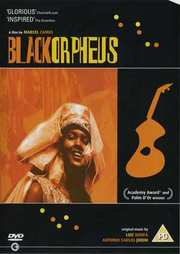
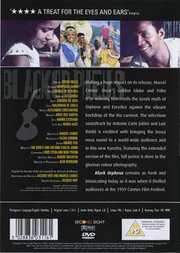












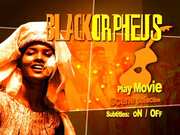

































Your Opinions and Comments
Be the first to post a comment!